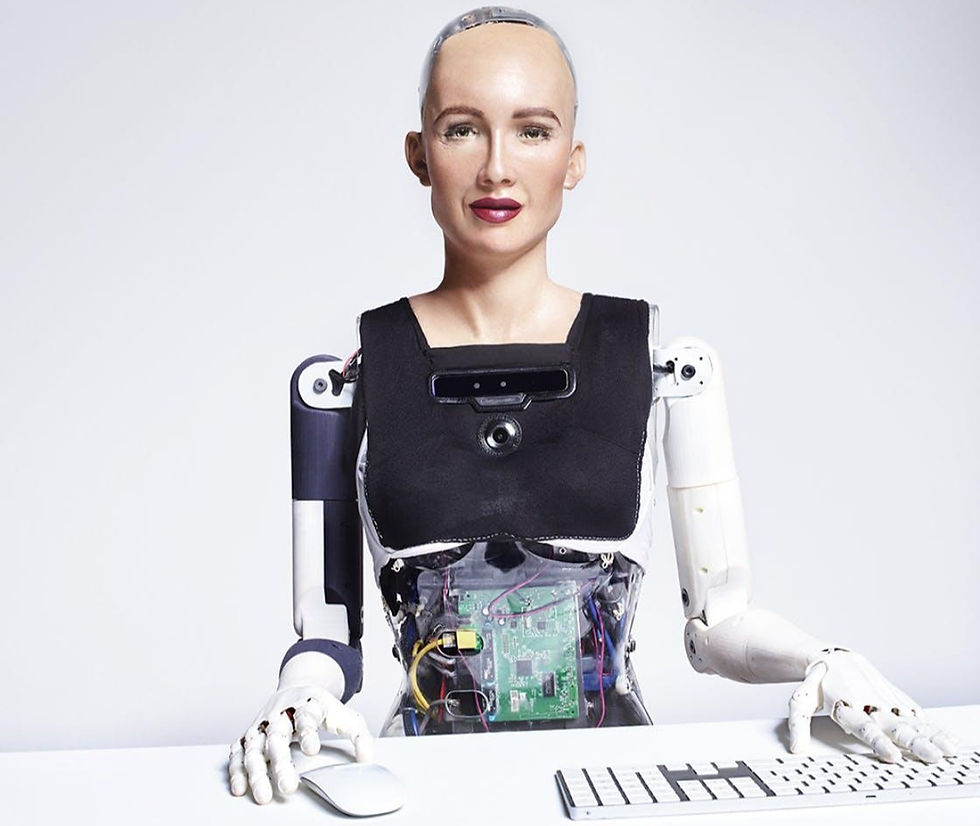Personal Identity Series: Future of Personal Identity: Flying Cars and Smiling Android
Foreword
Personal identity Series was designed as an independent series of articles around the topic of identity and self. It joins various philosophical, psychological, and sociological theories to explain the importance of personal identity and its inspiration on different existential questions. Articles will be saturated with diverse ideas, concepts, and anticipated or scientifically proven theories that encourage readers to dive deeper into the topic and identify their position in this dilemma.
Personal Identity Series consists of 8 articles. After completing the course, readers will be able to see the correlation between society and the self and vice versa.
Future of Personal Identity: Flying Cars and Smiling Android
Future of Personal Identity: Flying Cars and Smiling Android
In February 2016, Hanson Robotics activated a dream of the future called Sophia, the most advanced human-like robot in terms of engineering, science, and design. Being the first global robot citizen, Sophia became the robot Innovation Ambassador for the United Nations Development Program. It has traveled around the globe, and attended various conferences and TV shows, gaining extreme popularity in a short period (Hanson Robotics, 2020).
Sophia might have been created a few years ago, but the idea of robots living among humans has been around for decades. Various movies and books are displaying the envisioned future with flying cars and Artificial Intelligence (AI) machines with feelings and personalities. But is it possible that one day scientists will create an android with a personality? How will that look? And will it ever be possible to transfer identity to flesh and blood to metal corpus and wires? To create an AI with personality means that the robot should have a sense of self, and it is no surprise that a human-like AI that would integrate into society is the ultimate goal for scientists. Although progress in the field is very slow, it is developing, promising marvelous advancements and inventions.

Science Approach
To create an AI with identity, it is crucial to first understand what is self and how it is perceived. As Eckhart-Tolle explains, identity is the story of oneself; it includes memories, thoughts, dreams, ideas, values, vision, actions, and decisions (Wu, 2021). “In the egoic state, your sense of self, your identity, is derived from your thinking mind — in other words, what your mind tells you about yourself” (Eckhart-Tolle, n.d).
Indeed, having a sense of self is the core of being human. That is why scientists are attempting to apply an embodied simulation on robots to create an AI with human attributions and natural behavior; however, this still seems like a dream. One of the most significant successes in the field was the study of Task-agnostic self-modeling machines: the team of researchers working on the study developed a robotic arm that, as claimed by the scientists, has awareness of its physical shape; hence, it has a basic sense of self (Mohan, 2019). They did not put any data about the shape or size of the arm in the system, instead of that, a deep learning network was used to enable the creation of a self-model in the robotic arm through data from movements. This means that the AI was not fed information about its characteristics, but it had to figure it out based on its own “experience” (bumping into things, moving) and build a memory that would be used to predict future situations and identify necessary actions (Mohan, 2019).
However, does figuring our own shape and form mean that the robot can understand itself? Of course, no; there are various other features that involve the self, as discussed in previous articles, and apart from building memories and developing one's personality based on experience and society, the self needs emotions to be complete. Engineered Arts (2021) developed advanced human-like robots with mesmerizing facial expressions that are similar to humans. As Will Jackson, the founder, and CEO of the company explains, the idea behind these robots is natural interaction with humans. Judging from the mimics of the robots, one might think their science has already reached the level when machines have feelings too. However, As Dr. Eleanor Sandry (2020) explains, robots seem to express emotions, but it does not mean that they can feel them. They can not understand sadness or happiness and it is unlikely that, in a short period of time, robots will be able to feel anything.
Figure 2: Human-like robots by Engineered Arts
Philosophical Approach
Alexander Pruss developed an Artificial Intelligence and Personal Identity theory. In the introduction, he writes: "I am not asking in this paper whether this much is possible. I am asking, rather, whether even if we achieved all this, this would be genuine personhood” (Pruss, 2009). He brings an example of Robby, a robotic person, and asks “Suppose Robby is a robotic person, and I turn Robby off. Is Robby still in existence when turned off?” (Pruss, 2009). As discussed before, identity was believed to reside in the body, in mind, or the soul, although, to answer Pruss's question, one needs to analyze Robby’s case against each identity theory listed above.
As the Body Theory argues, a self remains as long as it resides inside the same body. Under this condition, even if Robby is turned off, it still exists inside the same physical form and material. As soon as it is turned on, it will continue to exist as the same robotic person it was before. On the other hand, suppose one needs to remove Robby’s battery - which is as crucial to Robby as a heart to a person - then does Robby cease to exist? Another approach to this dilemma is to perceive switched-off Robby as a sleeping person. Robby exists as much as a person who is sleeping. However, Robby, a robotic person, does not have a soul. A person sleeping remains as self and does not cease to exist because of the soul. In this case, there is nothing that could save Robby. The last argument about this dilemma concerns the mind and the memory theory of identity. Pruss asks if the recorded memories can save Robby, and finally concludes “That a record of memories exists does not mean that life continues, and similarly that a record of memories exists does not mean that Robby continues to exist” (Pruss, 2009). Moreover, memories and experiences create one’s identity through feelings and emotions. Robby, a robotic person, does not have feelings or emotions; therefore, his identity is not preserved by the mind and consciousness.

In conclusion, personal identity has been a puzzle for humankind for centuries. It ties everything together, meaning that every promise and every decision a person has ever made is connected to identity and self. This initiates the question of how identity is created and how is it altered over time? What happens to the identity once a person dies? Personal Identity Series has reviewed some of the most prominent personal identity and self theories. The last part, Future of Personal Identity: Flying Cars and Smiling Android, discussed the idea of AI and self. Various movies feature robots and androids with emotions and self-awareness. Also, transferring one's mind to an android body has been a popular idea in science fiction. However, current technological advancement can not promise any of this becoming reality in the near future, and the dream of human-like artificial intelligence still exists as a dream.
Bibliographical Sources
Cole, D. (1991). Artificial intelligence and personal identity. Synthese, 88(3), 399–417. https://doi.org/10.1007/bf00413555 Hanson Robotics Limited. (2020, September 1). Sophia. Hanson Robotics. https://www.hansonrobotics.com/sophia/ Mohan, V. (2019, February 27). Can robots ever have a true sense of self? Scientists are making progress. The Conversation. https://theconversation.com/can-robots-ever-have-a-true-sense-of-self-scientists-are-making-progress-112315 Pruss, A. R. (2009). Artificial Intelligence and Personal Identity. Faith and Philosophy, 26(5), 487–500. https://doi.org/10.5840/faithphil200926550 Will robots ever feel or have emotions? | Ask An Expert. (2020, September 9). [Video]. YouTube. https://www.youtube.com/watch?v=R4yNM5x52JE Wu, J. (2021, December 9). Our Identities In The Age of Artificial Intelligence. Medium. https://towardsdatascience.com/our-identities-in-the-age-of-artificial-intelligence-9bd83e5f0bfa
Visual Resources




I recently started using NLP services for data analysis and I must say, the experience has been truly transformative. The ability to extract valuable insights from unstructured data with such precision and efficiency is nothing short of remarkable, look more at https://valiantceo.com/exploring-the-benefits-of-nlp-services-for-data-analysis/ . The natural language processing algorithms have made the entire process seamless and intuitive, allowing me to uncover patterns and trends that were previously hidden. I am now able to make more informed decisions and drive better outcomes for my business. I highly recommend exploring the benefits of NLP services for anyone looking to elevate their data analysis capabilities.